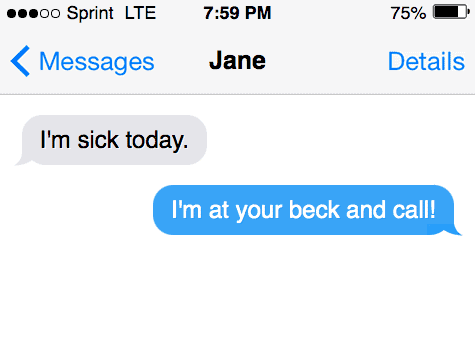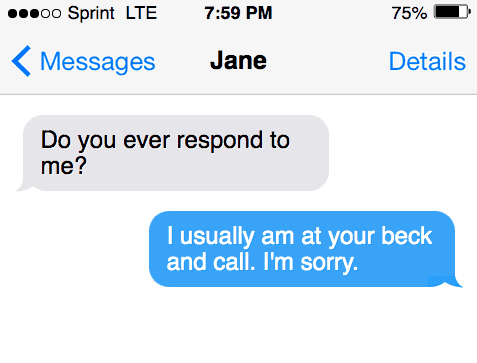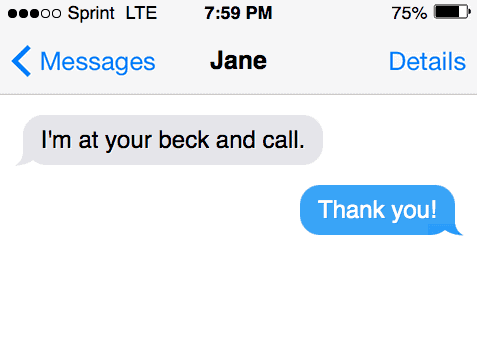Is it “beck and call?” Or “beckon call?” Continue reading to find out which is right: beck and call or beckon call. And how to correctly use the term in everyday life, writing, and more.
What does “beck and call” mean?
To be at a ‘someone’s beck and call’ means being readily available to assist them at a moment’s notice; or to immediately be at their service, command, or request.
The dictionary defines beck and call as “always ready to do whatever someone asks.”
The correct way to say and spell the phrase is beck and call. The phrase “beckon call” is incorrect spelling and doesn’t mean anything in English. That said, beckon call is a common misspelling of beck and call, so much so that it’s now considered an eggcorn.

Which is the correct phrase: beckon call or beck and call?
Here is the correct way to say “beck and call.”
 Correct: beck and call
Correct: beck and call
 Incorrect: beckon call
Incorrect: beckon call
What’s an Eggcorn?
The term eggcorn was coined by the linguist Mark Liberman in his Language Log in 2003. Liberman writes in his log, “A woman wrote ‘egg corns’ for ‘acorns.'”
In his attempt to identify this mistake under existing linguistic terms or phenomena, Liberman did not find a suitable phrase that captured the true meaning of eggcorn.
Fellow linguist Geoffrey Pullum suggested that the term should itself be called an eggcorn; since it is what it means (that’s to say: an eggcorn is itself an eggcorn, aka a mishearing of an original phrase that is commonly reproduced and mistaken by others.)
In 2010, eggcorn became an official word in the Oxford English Dictionary, meaning:
A word or phrase that results from a mishearing or misinterpretation of another, an element of the original being substituted for one that sounds very similar or identical (e.g., tow the line instead of toe the line).—Oxford English Dictionary, 2010.

“Beckon call” is an eggcorn
This makes ‘beckon call’ an eggcorn, since the correct spelling of the idiom is to ‘be at someone’s beck and call.’ Other examples of eggcorns include:
- Escape goat instead of the correct term, scapegoat
- Biting my time instead of biding my time.
- Nipped it in the butt instead of nipped in the bud.
- Mute point instead of moot point.
- Last stitch effort instead of last ditch effort.
- As dust fell instead of as dusk fell.
- Got off scotch free instead of scot-free.
Examples of beck and call in a sentence
Each sentence below demonstrates how to use the expression beck and call.
- “He adored his wife and was constantly at her beck and call at a moment’s notice.”
- “It’s no wonder celebrities look good all the time; they have hairstylists and makeup professionals at their beck and call!”
- “Whenever you need anything, just let me know. I’m at your beck and call.”
- “The attending nurses at the hospital are incredible. They are at each patient’s beck and call.”
- “The king had every servant at his beck and call.”
Hopefully, these sentences using beck and call clarify their proper use cases!

Other ways to say beck and call
The following phrases, words, and idioms work as synonyms for beck and call:
- To be wrapped around one’s finger
- Under one’s thumb
- In the saddle
- All systems go
- Champing at the bit
- In the first position
- Primed
The origin story of beck and call
The first known use of the term beck and call was written in a compendium of poems called Salve Deus Rex Judaeorum (Hail, God, King of the Jews) by the English poet (and the first woman ever to assert herself as a poet!) Aemilia Lanyer, in 1611. The excerpt below is Lanyer’s original use of the expression, which appears in her collection of poems mentioned above.
How much are we to honor those that springs
From such rare beauty, in the blood of Kings?
The Muses doe attend vpon your Throne,
With all the Artists at your becke and call;
—Aemilia Lanyer, 1611
Definition of beck
The word beck is defined as “to make a mute sign, signal by a nod or gesture” and is a shortened version of the verb “beckon.”
Origin of the word beckon
The word beck originates from the Germanic and was passed down to Middle English from the Norse word bekkr. The word beck is related to the Dutch word beek.
Used in literature, the word beck can refer to a brook, such as a small stream with a stony bed.
Check out other commonly misused idioms
Is it foolproof or full proof? Not sure? The answer is foolproof. Read the foolproof method on how to use the term foolproof.
Bear with me or bare with me? Which is right? Bear with me while explaining the proper expression.
Glossary
- Definition of eggcorn: en.wikipedia.org/wiki/Eggcorn
- Definition of the word beck: merriam-webster.com/dictionary/beck
- Definition of the idiom beck and call: webster.com/dictionary/beck
Sources
- beck | Etymology, origin and meaning of beck by etymonline
- Salve Deus Rex Judaeorum
- Emilia Lanier – Wikipedia
- The 30 most misused phrases in the English language
- At someone’s beck and call – Merriam-Webster
- Mark Liberman’s Home Page – Penn Linguistics
Inside this article
Fact checked:
Content is rigorously reviewed by a team of qualified and experienced fact checkers. Fact checkers review articles for factual accuracy, relevance, and timeliness. Learn more.
Core lessons
Glossary
- Abstract Noun
- Accusative Case
- Anecdote
- Antonym
- Active Sentence
- Adverb
- Adjective
- Allegory
- Alliteration
- Adjective Clause
- Adjective Phrase
- Ampersand
- Anastrophe
- Adverbial Clause
- Appositive Phrase
- Clause
- Compound Adjective
- Complex Sentence
- Compound Words
- Compound Predicate
- Common Noun
- Comparative Adjective
- Comparative and Superlative
- Compound Noun
- Compound Subject
- Compound Sentence
- Copular Verb
- Collective Noun
- Colloquialism
- Conciseness
- Consonance
- Conditional
- Concrete Noun
- Conjunction
- Conjugation
- Conditional Sentence
- Comma Splice
- Correlative Conjunction
- Coordinating Conjunction
- Coordinate Adjective
- Cumulative Adjective
- Dative Case
- Determiner
- Declarative Sentence
- Declarative Statement
- Direct Object Pronoun
- Direct Object
- Diction
- Diphthong
- Dangling Modifier
- Demonstrative Pronoun
- Demonstrative Adjective
- Direct Characterization
- Definite Article
- Doublespeak
- False Dilemma Fallacy
- Future Perfect Progressive
- Future Simple
- Future Perfect Continuous
- Future Perfect
- First Conditional
- Irregular Adjective
- Irregular Verb
- Imperative Sentence
- Indefinite Article
- Intransitive Verb
- Introductory Phrase
- Indefinite Pronoun
- Indirect Characterization
- Interrogative Sentence
- Intensive Pronoun
- Inanimate Object
- Indefinite Tense
- Infinitive Phrase
- Interjection
- Intensifier
- Infinitive
- Indicative Mood
- Participle
- Parallelism
- Prepositional Phrase
- Past Simple Tense
- Past Continuous Tense
- Past Perfect Tense
- Past Progressive Tense
- Present Simple Tense
- Present Perfect Tense
- Personal Pronoun
- Personification
- Persuasive Writing
- Parallel Structure
- Phrasal Verb
- Predicate Adjective
- Predicate Nominative
- Phonetic Language
- Plural Noun
- Punctuation
- Punctuation Marks
- Preposition
- Preposition of Place
- Parts of Speech
- Possessive Adjective
- Possessive Determiner
- Possessive Case
- Possessive Noun
- Proper Adjective
- Proper Noun
- Present Participle
- Prefix
- Predicate



